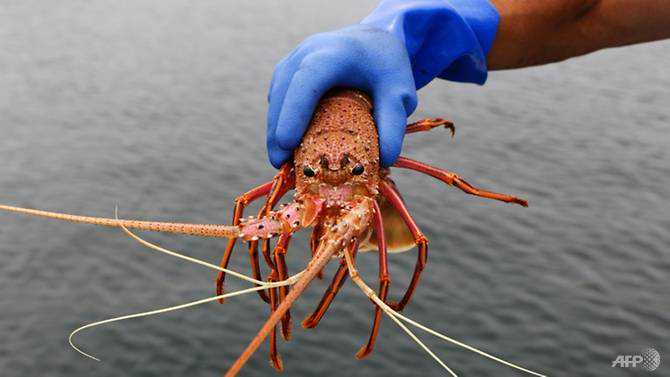Australian lobster sector claws back trade after China ban
27 December, 2020

Possibly in the scorching Australian summer sun, long queues of clients snake round Fremantle harbour - a soothing sight for beleaguered neighborhood fishermen trying to displace lost business with China.
Australia's rock lobster exports happen to be worth half of a billion US us dollars a year - and found in normal times, 94 % of them head to China.
But almost all that changed a couple weeks ago, when Beijing imposed a near-total import ban on lobster, part of a broader politically charged "shadow trade battle".
"It has damaged us drastically," third-era fisherman Fedele Camarda told AFP. "Our income has been reduced significantly."
Fisherman Michael Vinci offers live western rock lobsters from his boat. The general public has responded enthusiastically to the boat sales, queuing in the heat to buy on the quay in Fremantle. (Image: AFP/Trevor Collens)
Relations between Canberra and Beijing have been around in free-fall for most of this season, with China hitting out at a set of issues including Australia's demand an inquiry in to the origins of COVID-19 and a good ban on Huawei's participation found in the country's 5G network.
The row has seen greater than a dozen Australian sectors hit with import levies, with the barley and wine industries particularly badly hit. Exporters stand to reduce just as much as US$2 billion to US$4 billion worthwhile of sales.
Up to now, the broader Australian overall economy has weathered the storm. The market came back to growth within the last quarter, exiting a coronavirus-induced recession.
But individual businesses have already been forced to find clients and markets overnight in order to avoid red ink, task cuts or bankruptcy.
CLOSE TO HOME
Some barley farmers possess planted different grains or re-routed shipments to the center East, and winemakers have centered on selling more in Japan.
However the lobster industry is searching closer to home.
Joe Paratore displays his capture of western rock lobsters to buyers found in Fremantle. Australian fishermen experienced to find new market segments for their get after China imposed a near-total ban on lobster. (Image: AFP/Trevor Collens)
In a bid to help the ravaged sector, local authorities recently changed legislation to permit commercial rock lobster fishers to sell large quantities from the back of their boats during December and January.
Up to now the Australian public has responded enthusiastically, offering a much-needed lifeline to Camarda and his fellow vendors.
Prior to the Covid-19 pandemic, prices topped US$80 a kilogram in Western Australia and usually averaged around US$53 per kilogram.
On one muggy pre-Holiday weekday, sweat-drenched buyers bought the world-renowned western rock lobster direct on the quay for US$34 a kilogram - a 36 % markdown.
"That's just enough to break even," Camarda said. "But we've been selling out nearly every working day. We are spending pre-orders as people want it for Christmas."
To greatly help the fishing industry, authorities just lately changed legislation to allow commercial rock lobster fishers to market large quantities from the trunk of their boats during December and January. (Image: AFP/Trevor Collens)
Ensuring they were create to control orders and make the merchandise available to the public had been "a crash study course", he admitted.
Such may be the demand across Australia that plenty of supermarkets have had to put limits on the amount of lobsters customers can buy.
Nick Van Niekerk, a resident of nearby Mosman Park, was one of those braving heat to stand in line for 30 minutes.
"I came right down to support the neighborhood fishermen and exhibit that people as a community health care," he said. "It is critical to be capable of geting lobsters directly from the boats and really know what you're actually getting.
"Lobsters are often really expensive, so to get them at an affordable price I think is great for the neighborhood community."
THE LONG HAUL
But everyone acknowledges back-of-the-boat sales certainly are a short-term fix.
In the long run, Australia's fishermen are looking to obtain a higher value again in market segments like Japan, america and Europe, and not just depend on one, politically fickle, customer.
"China was ready to fork out more and the whole industry was essentially moved there," stated Keith Pearce, the former president of the neighborhood Professional Fishermen's Association.
Australian fisherman Joe Paratore displays his catch of your day to customers at the harbour in Fremantle. (Image: AFP/Trevor Collens)
"The market would have to be diversified and that means you don't conclude with the difficulty we've today," he added.
Camarda is optimistic that the sector may pull though, regardless of the continued uncertainty.
His grandfather began dropping craypots in Fremantle in 1912 having result from Italy four years earlier, and he hopes that tradition can continue.
"My spouse and children has been around the sector for generations but this can be the sort of issue we need to endure every once in awhile," he said.
Australia's rock lobster exports are worth half a billion US us dollars a year - and in normal times, 94 % of them go to China. (Image: AFP/Trevor Collens)
His 21-year-old child James has begun angling by his part on the Neptune III.
"It would be pleasant if he has the possibility to make a career out of this if he really wants to go down that route."
"But we are in this article for the long term. We will find methods to survive."
Source:
